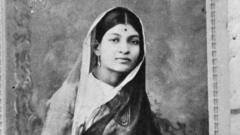The 1925 murder of Abdul Kadir Bawla not only captivated Bombay but also triggered political turmoil, leading to the abdication of Maharaja Tukoji Rao Holkar III. With themes of love, abduction, and colonial intersecting, the case left an indelible mark on India's history.
The Bawla Tragedy: A Century Since the Murder that Brought Down a Maharaja

The Bawla Tragedy: A Century Since the Murder that Brought Down a Maharaja
A century after the shocking 1925 murder of businessman Abdul Kadir Bawla in Bombay, the complex case exposes the tangled web of love, politics, and colonial scrutiny.
A murder that cast a long shadow over colonial India, marking a significant turning point in its political landscape, took place on January 12, 1925. In an upscale suburb of Bombay (now Mumbai), Abdul Kadir Bawla, a wealthy textile mogul and the youngest municipal official, was fatally shot while he was out for a drive with his companion, the courtesan Mumtaz Begum. This act of violence soon spiraled into a sensational affair that captured the public's attention, leading to a complex investigation and trial that would eventually shake the very foundations of princely power in India.
Newspapers dubbed it "one of the most sensational crimes of British India," as details unfolded regarding the attackers' motivations and their possible ties to the princely state of Indore, governed by Maharaja Tukoji Rao Holkar III. Bawla and Begum had been living together for months, igniting jealousy and scorn from the Maharaja, who had tried to control the courtesan during her time in his harem.
The fatal incident began when another vehicle blocked Bawla's car. Armed men demanded that Begum be taken from the car before turning on Bawla, who succumbed to his injuries hours later. As British soldiers happened upon the chaotic scene, they apprehended one attacker, prompting a manhunt that led to the capture of several men connected to the Maharaja.
As the investigation revealed an elaborate conspiracy, public pressure mounted on the British authorities, who faced scrutiny from Bawla's affluent Muslim community and Indian lawmakers. The matter escalated to discussions in the British House of Commons, marking a rare crossover between crime and colonial governance. Amid the outcry, police reports indicated the murder was orchestrated to silence Bawla, who had ignored warnings to cease sheltering Begum.
The trial gained prominence as top lawyers represented both sides, including Muhammad Ali Jinnah, who would later become Pakistan's founding father. Despite the intrigue, the court's decisions were met with criticism for failing to hold the Maharaja accountable, sparking further backlash regarding the British Raj's handling of justice.
Confronted with overwhelming evidence and pressure, the Maharaja chose to abdicate, relinquishing his throne in exchange for immunity from inquiry. His scandalous personal life continued to create headlines, including his marriage to an American woman, further complicating the narrative surrounding the murder.
The case not only riveted the public imagination in the 1920s but also continues to resonate in contemporary discussions about colonial legacy, gender politics, and power dynamics. Mumtaz Begum's story faded from the limelight, but her initial fame drew attention to issues of agency and desire in a changing society, making the Bawla murder a pivotal chapter in India’s turbulent history.




















